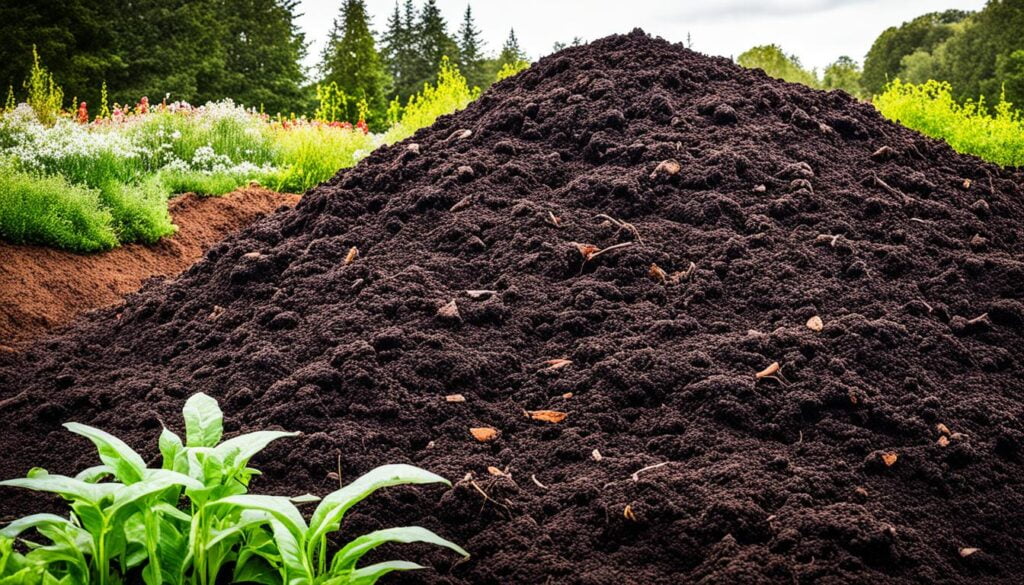Composting is a natural and eco-friendly way to manage organic waste and turn it into nutrient-rich compost that can enhance your garden.
With so many composting methods to choose from, it can be overwhelming to determine which one is the most efficient. However, by considering your goals, space, and personal preferences, you can find the composting method that best suits your needs.
Whether you opt for community composting, bokashi, worm bins, green cones, or black soldier flies, each method has its own advantages and can contribute to reducing food waste and providing environmental benefits.
By exploring the different composting techniques available, you can find the most efficient method that aligns with your objectives and allows you to make the most of your organic waste.
Key Takeaways:
- Composting is a natural and eco-friendly way to manage organic waste.
- There are various composting methods to choose from.
- Consider your goals, space, and personal preferences when selecting a composting method.
- Community composting, bokashi, worm bins, green cones, and black soldier flies are all efficient composting methods.
- Exploring different composting techniques will help you find the method that suits your needs and reduces food waste.
Community Composting
Living in an urban area or a community with limited space doesn’t mean you have to miss out on the benefits of composting. Community composting is a fantastic option that allows you to participate in the composting process while also contributing to a sustainable waste management solution.
Many municipalities now offer green waste pickup and city-wide composting services, making it convenient for residents to dispose of their organic waste responsibly. These services not only help reduce landfill waste but also provide valuable compost that can be used to enrich soil in gardens and farms.
If you prefer a more hands-on approach to composting, you can consider hiring a private company that offers composting services. Companies like Compost Now provide convenient and reliable composting solutions for a fee. In return, they provide you with finished compost that you can use in your own garden or donate to a community garden.
Speaking of community gardens, they are another excellent option for community composting. These gardens often have their own compost piles where you can contribute your kitchen or yard waste. By participating in community composting through a local garden, you not only reduce your own waste but also support the growth of fresh produce and foster a sense of community.
Another way to get involved in community composting is by connecting with local farmers or gardeners in your area. Many farmers and gardeners have their own compost piles and would appreciate adding your green waste to their existing compost. This collaboration benefits both parties, as it reduces waste while providing valuable organic matter for the farmer’s or gardener’s soil.
When looking for local farmers or gardeners, consider visiting farmers’ markets. Not only can you buy fresh produce directly from these dedicated individuals, but you can also find potential collaborators for community composting initiatives. By supporting local farmers, you contribute to the sustainability of your community and promote environmentally friendly practices.
Community composting offers an inclusive and impactful way to reduce waste and nurture the environment. Whether you take advantage of green waste pickup services, hire a private company, contribute to community gardens, or collaborate with local farmers, your efforts in community composting make a meaningful difference. By embracing these options, you actively contribute to a more sustainable future while experiencing the benefits of a nutrient-rich compost that supports healthy plant growth.
Bokashi and Worm Bin Composting
Indoor composting is becoming increasingly popular among hobby farmers, as it offers a convenient and efficient solution for managing organic waste in small spaces. Two popular methods for indoor composting are bokashi and worm bin composting.
Bokashi is a unique process that utilizes anaerobic bacteria to ferment food waste. By adding inoculated bran to your food scraps, you create an environment that encourages the growth of beneficial bacteria. This fermentation process breaks down the organic matter and produces a rich, acidic substance. You can then bury this acidic matter in your soil or add it to a traditional compost pile, where it will continue to decompose and contribute valuable nutrients to your plants.
Worm bin composting, also known as vermicomposting, involves using earthworms to decompose organic waste. You can set up a worm bin indoors, such as under your sink or in a dedicated container. The worms consume the food scraps and transform them into nutrient-rich worm castings, also known as vermicompost. These castings can be directly applied to your plants as a natural fertilizer, providing essential nutrients for their growth.
Both bokashi and worm bin composting offer efficient methods for managing organic waste while producing valuable compost. These indoor composting techniques are perfect for hobby farmers with limited outdoor space, allowing you to reduce waste, improve soil health, and nurture your plants all year round.

